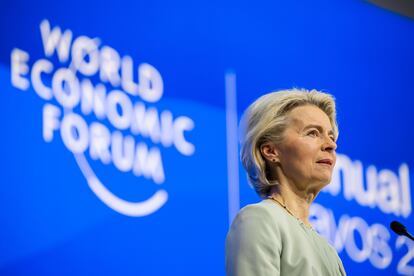Brussels proposes tightening control over foreign investments made through subsidiaries in Europe
The EU Commission is setting out a plan to guarantee European economic security with an eye on China and the Middle East


Brussels is beginning to deploy concrete proposals to achieve “European economic security” in a geopolitical context of growing hostility between powers. With this goal in mind, it is proposing tighter control over foreign investments to prevent strategic companies from falling into unwanted hands, mainly Chinese but also from Middle Eastern countries. In a package of proposals to be presented today Wednesday, and to which EL PAÍS has had access, the EU Commission tweaks existing regulation to ensure that this does not happen through EU subsidiaries of foreign investors. The EU’s executive arm also insists on the need to control exports of dual-use technology (civilian and military) and to monitor European investments in advanced technologies in third countries. In these last two cases, the proposal is not mature yet, and what the Commission proposes is to continue the debate between the Member States.
Extending oversight to indirect investments and adopting a more homogeneous approach to current national regulations are two of the elements of a larger drive to “protect the economic security of the EU with a range of policies and tools,” according to the draft proposal that EU commissioners will analyze. By expanding the definition, EU officials are also trying to prevent countries within the EU from being used as a free port of entry to the continent, since there are Member States that until now have shown little interest in deploying control mechanisms. Sources from the European Parliament pointed to Cyprus and Malta, two members with very favorable investment frameworks.
The invasion of Ukraine, the surge of China, the explosive situation in the Taiwan Strait and even the potential return of Donald Trump to the White House are pushing the EU to prioritize what is being termed “European economic security.” It is a concept that complements another notion that has also gained prominence in recent years, “strategic autonomy.” Both seek to define a strategy by which the EU is trying to reduce its dependence on China for key technologies for the green transition and essential raw materials, on Russia for energy and on Taiwan for technology.
The Commission already outlined its plans to achieve “European economic security” last June. In that document, as in the new one, neither China nor other countries that could be considered to pose a strategic challenge or threat are singled out by name. However, it is evident where the focus is. For example, in 2016 a debate opened up over the acquisition of a German advanced robotics company, Kuka, which led Berlin to lower the foreign investment control thresholds from 25% to 10% in 2018. A few months later European regulation for the control of foreign investments came into effect, allowing the Commission to give its opinion on these corporate activities if it considers that they pose a risk, although the ability to adopt measures continues to rest with member states. This, however, did not prevent the Commission from intervening in China’s bid to take over the port of Hamburg in Germany, where it ended up buying 25% and not the 35% initially agreed upon.
Although China’s investment in the EU has decreased in recent years, European officials’ focus is on Beijing more than in the last decade, given the geopolitical changes caused by the invasion of Ukraine and China’s greater rapprochement with Russia. According to Rodhium Group, a consulting firm specialized in the Asian giant, Beijing has gone from investing over €45 billion in 2016 to €7.3 billion in 2022, including the United Kingdom. One of the most attractive destinations two years ago was Hungary, where a battery gigafactory was set up.
This regulation is what the Commission now wants to amend, following recommendations from the European Court of Auditors, “to avoid gaps in the control of risky transactions, focus on cases that present the greatest risks and guarantee greater responsibility within the system regarding to security or public order concerns expressed by member states and/or the Commission.”
Investment control is just one of the legs on which Brussels proposes to build this “economic security.” It is, at the moment, the point at the most advanced stage. The others are much less so. In June, the Commission proposed increasing surveillance on dual-use exports (civilian and military) — something now prohibited with Russia for many products due to the sanctions for invading Ukraine — and taking extreme care with investments in advanced strategic technologies that are outside the territory of the Union. In both cases, however, the approach taken by Ursula von der Leyen’s executive is cautious in proposing to “promote debate” among the member states with white papers to reach consensus before launching into regulation. This care is justified by the need to seek internal unity and also to present more mature projects that will probably attract significant criticism outside the continent and possibly similar responses in third-party states.
Sign up for our weekly newsletter to get more English-language news coverage from EL PAÍS USA Edition
Tu suscripción se está usando en otro dispositivo
¿Quieres añadir otro usuario a tu suscripción?
Si continúas leyendo en este dispositivo, no se podrá leer en el otro.
FlechaTu suscripción se está usando en otro dispositivo y solo puedes acceder a EL PAÍS desde un dispositivo a la vez.
Si quieres compartir tu cuenta, cambia tu suscripción a la modalidad Premium, así podrás añadir otro usuario. Cada uno accederá con su propia cuenta de email, lo que os permitirá personalizar vuestra experiencia en EL PAÍS.
¿Tienes una suscripción de empresa? Accede aquí para contratar más cuentas.
En el caso de no saber quién está usando tu cuenta, te recomendamos cambiar tu contraseña aquí.
Si decides continuar compartiendo tu cuenta, este mensaje se mostrará en tu dispositivo y en el de la otra persona que está usando tu cuenta de forma indefinida, afectando a tu experiencia de lectura. Puedes consultar aquí los términos y condiciones de la suscripción digital.








































